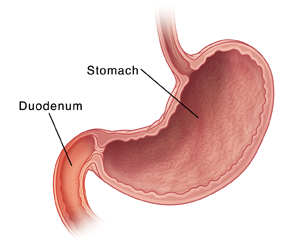The duodenum is the first part of the small intestine. It's just past the stomach. Duodenitis is inflammation of the lining of the duodenum. The information below explains more about this health problem.
Causes of duodenitis
The most common cause of duodenitis is infection by H. pylori (Helicobacter pylori) bacteria. You can also get this health problem if you:
-
Take nonsteroidal anti-inflammatory drugs (NSAIDs), such as aspirin and ibuprofen, for a long time
-
Have celiac disease, an allergy to gluten
-
Have Crohn's disease
-
Drink alcohol
-
Smoke
Symptoms of duodenitis
The condition may cause no symptoms. If symptoms do happen, you may have:
-
Burning, cramping, or hunger-like pain in your stomach
-
Gas or a bloated feeling
-
Lack of appetite
-
Upset stomach (nausea) and vomiting
-
A full feeling soon after starting a meal
-
Tar-colored or dark stools
-
Fatigue and a low blood count if ulcers are bleeding
Diagnosing duodenitis
If your healthcare provider thinks you have duodenitis, you may have these tests to make sure:
-
Upper endoscopy with biopsy. During this test, a thin, flexible tube with a light and camera on the end (endoscope) is used. Your healthcare provider moves the scope down your throat to the stomach and into the duodenum. The scope sends images of the duodenum to a video screen. Small samples (biopsy) of the lining of the duodenum may be taken. These samples will be sent to a lab for testing for H. pylori.
-
Blood, stool, gastric biopsy, or breath test. These tests can check for H. pylori or other germs. Samples of blood or stool are taken and tested in a lab. Blood tests can also check for celiac disease. For a breath test, you swallow a harmless compound. If H. pylori bacteria are in your body, extra carbon dioxide gas can then be found in your breath.
-
Upper gastrointestinal (GI) series (in rare cases). This test can give more information about the digestive tract. It takes X-rays of the upper GI tract from the mouth to the small intestine.
Treating duodenitis
If you have duodenitis, one or more of these treatments may help:
-
Taking antibiotic medicines to kill H. pylori
-
Taking medicines to reduce the amount of acid the stomach makes
-
Not taking NSAIDs such as aspirin and ibuprofen. But if you take aspirin for a health problem, such as heart disease or stroke, don't stop until you check with your healthcare provider. If you take NSAIDs for arthritis or pain, check with your provider about other pain medicine options.
-
Adopting a gluten-free diet if celiac disease is the cause
-
Not drinking alcohol
-
Stopping smoking
Your healthcare provider can tell you more about what treatments are needed.
Recovery and follow-up
With treatment, most cases of duodenitis go away. In rare cases, it can be an ongoing (chronic) problem or progress into a duodenal ulcer. If your symptoms don't get better or they go away and come back, tell your healthcare provider. In such cases, checkups and treatments are needed to handle the health problem.
When to call the healthcare provider
Call your healthcare provider or seek medical care right away if you have any of these:
-
Fever of
100.4 ° F (38.0 °C) or higher, or as advised by your healthcare provider -
Chills
-
Nausea or vomiting (vomit may be bloody or look like coffee grounds)
-
Dark, tarry, or bloody stools
-
Sudden or severe stomach pain
-
Pain that doesn't get better with treatment
-
Rapid weight loss


